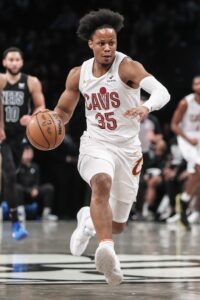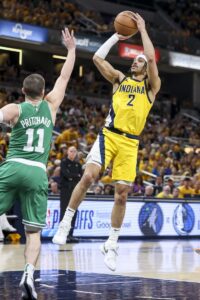Nearly four weeks after the NBA’s free agent period opened, Isaac Okoro is the only standard restricted free agent who remains unsigned. And with little cap room still available around the league and few teams seemingly inclined to use their full mid-level exception, the Cavaliers have “a ton of leverage” in their negotiations with the RFA forward, Chris Fedor of Cleveland.com stated in the latest episode of the Wine & Gold Talk podcast (YouTube link).
 “The sense that I get in talking to a lot of people around the NBA, I’m not sure what the offer is specifically that the Cavs have made to Isaac, (but) they believe that it’s a fair offer. It’s a multiyear offer,” Fedor said (hat tip to HoopsHype). “It’s what they think he’s worth based on the construction of this particular roster and based on the role that he’s going to have for this roster. I don’t know exactly what the offer is that they have made, but the sense that I get in talking to people around the NBA is that it’s a multiyear offer in the annual range of $8 to $10 million.
“The sense that I get in talking to a lot of people around the NBA, I’m not sure what the offer is specifically that the Cavs have made to Isaac, (but) they believe that it’s a fair offer. It’s a multiyear offer,” Fedor said (hat tip to HoopsHype). “It’s what they think he’s worth based on the construction of this particular roster and based on the role that he’s going to have for this roster. I don’t know exactly what the offer is that they have made, but the sense that I get in talking to people around the NBA is that it’s a multiyear offer in the annual range of $8 to $10 million.
“If it gets to a point where Isaac and his people are looking for multiple years around $12 to $15 million, right around the mid-level exception, that’s not a number that the Cavs would be comfortable with moving forward.”
After signing Evan Mobley and Donovan Mitchell to lucrative new long-term extensions this offseason, the Cavs will have three maximum-salary players on their roster beginning in 2025/26. With stricter spending restrictions in effect under the league’s new Collective Bargaining Agreement, the team is wary about committing an annual salary well into the eight figures for a player like Okoro who doesn’t project to be a starter, per Fedor.
As Fedor explains, Cleveland would be comfortable with Okoro accepting his qualifying offer, which would pay him $11,828,974 in 2024/25 and would put him on track for unrestricted free agency next summer. While they’d be reluctant to pay him that amount for several seasons, the Cavs are OK with that number for one year before the rest of the roster gets more expensive.
Okoro, meanwhile, will have to determine whether he likes the idea of betting on himself by taking a higher 2024/25 salary and returning to free agency in about 11 months, or if he prefers the security of a multiyear deal that will pay him a little less next season.
Of course, it would be ideal for Okoro if another suitor swooped in to put pressure on the Cavaliers, but given that no team has emerged to this point to aggressively pursue him, that suitor may not be out there. I’ve speculated a couple times that Detroit would be a fit for the former No. 5 overall pick, given the J.B. Bickerstaff connection, the Pistons’ remaining cap room (approximately $11MM), and the fact that Detroit could afford to be patient with Okoro’s development on offense. But there have been no real indications that the Pistons are interested.
Okoro is an excellent point-of-attack defender whose offensive contributions remain relatively limited. The 23-year-old knocked down a career-high 39.1% of his three-point attempts last season, but that was on low volume (1.2 makes per game), with opposing defenses often sagging off of him.
The Cavs are currently operating about $9.7MM below this season’s luxury tax line, with 12 players under contract. If they sign a minimum-salary player as their 13th man and leave their 15th roster spot open, they could sign Okoro for about $25MM over three years or $34MM over four and remain barely below the tax line. However, the fact that they’re willing to live with Okoro signing his $11.8MM qualifying offer suggests the Cavs aren’t necessarily committed to staying out of tax territory.
 “The sense that I get in talking to a lot of people around the NBA, I’m not sure what the offer is specifically that the Cavs have made to Isaac, (but) they believe that it’s a fair offer. It’s a multiyear offer,” Fedor said (hat tip to
“The sense that I get in talking to a lot of people around the NBA, I’m not sure what the offer is specifically that the Cavs have made to Isaac, (but) they believe that it’s a fair offer. It’s a multiyear offer,” Fedor said (hat tip to  JULY 24: The Pacers and guard
JULY 24: The Pacers and guard 